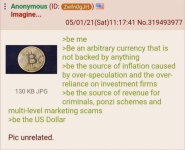They don't. In the US, tracking of all transactions already exists (credit card companies do this) and they can also reject your transactions (either by not allowing a store to use their card, or declining your card). More, any exchange over $600 is reported automatically to the IRS.They do though.
Credit card companies can absolutely stop doing business with gun companies. They could do that tomorrow if they wanted to. They can fork over info about how many 80% receivers you bought online to the Feds without the feds asking.
You are also assuming that more laws won't be made that further restrict you, that the court will not be packed (which Biden is openly calling for), that the lawfare waged on you won't cost you everything, etc. Or just have monero, gold, or physical cash, and be immune to that.

